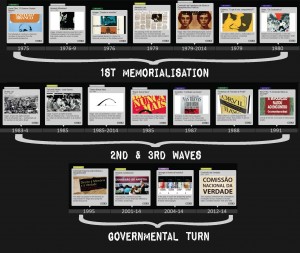Gisele Iecker de Almeida, History Dept. Research group meta- and public history, gisele.ieckerdealmeida@ugent.be
Abstract
Collective memory is a social construction, and a lot of politics goes into what makes the pages of history books. During the military dictatorship (1964-1985), violent repression against civilians and censorship were commonplace in Brazil. The forging of the memory of the “years of lead” has been a lengthy process, that already started during the dictatorial period when the first attempts were made to write its history. In the mid-80s, a conciliatory left published its version of the past, in what is considered a romanticized and myth-making perspective. And then it was the turn of a more critical left. In a recent development of this memory politics, the Brazilian government ended a long period of silence, pushing forward a number of initiatives to reshape the memory of those dramatic years. Some of the most relevant actors in the politics of Brazilian post-dictatorial collective memory are presented in this poster in their historical context.
The 1st memorialisation emerges still during the military dictatorship: from the mid-70s to the early 80s, myths and stereotypes are created both on the left & the military. The irresponsibility of those “crazy years” is highlighted on the left, portraying militants as a typical product of the 60s. In the military front, the pervasive view of a “soft dictatorship” (“ditabranda”) takes hold.
The end of military rule in 1985 sees an ingraining of the shared memories belonging to the different stakeholders. The 2nd wave of memorialisation shows signs to be more factual and evidence-based, with argumentation and counter-argumentation from both sides, painting the picture of a “heroic democratic resistance” (from the left) against the “defenders of the country” (from the right). Both camps point fingers and play innocent. Family members of those killed or disappeared are in the early days of their long fight for truth and justice.
Reis Filho (1997) symbolises a 3rd wave in the memory of the “years of lead”: a former guerrilla fighter, who recognises the intent to install a communist regime in the country (as opposed to a democracy as the 2nd wave supposed), and criticises the methods of the left. At this stage, some earlier misconceptions start to be more closely examined.
The governmental turn started in 1995 with the acknowledgement of illegal activities by the regime sees a shift in the state’s positioning in this debate. From the initial denial of any wrongdoing, intimidation and even disruption of investigations, the Brazilian government has gradually moved towards the recognition of the rights of those affected by the crimes committed in its name. This process only really gathered momentum in the last decade, which has seen an upsurge in academic interest in the topic, an increasing number of requests for amnesty and restitution, and the appointment of a Truth Commission. The silence game seems to be finally over.
These twists and turns in post-dictatorial memory politics explain the Brazilian failure in reaching a collective – “shared” – memory of the dictatorship. According to Margalit (2002), shared memories are the aggregation of different versions, which eventually forge one version of the narrative accepted by the community. Two antagonising versions cannot make a congruous narrative. The Brazilian government has made a shift towards the version of events presented by the left, not without generating controversy amongst reactionary quarters. The memory of the “crazy years of lead” divides Brazilian society to this day.
Conclusion
Almost three decades on, and Brazil is still trying to conciliate the diverging versions offered by different stakeholders of its post-dictatorial memory politics. The main bearers of this memory have been the family members of the disappeared, and to a lesser extent the military itself (albeit in a counter-argumentative way) and former left-wing militants. The government for decades either silenced on this topic, or actively attempted to stop further investigations into the crimes against humanity committed on its behalf. A recent turn of events has seen the return of this debate to front page news, and the government leaning towards a more leftist perspective. This constant re-writing and re-reading of the past highlights the social construction that characterises the construction of collective “shared” memory.
References
• CABRERA, C. A. ‘Do Luto à Luta’ Anos 90, v. 19, n. 35, 2012.
• FICO, C. ‘Versões e controvérsias sobre 1964 e a ditadura militar’, Revista Brasileira de História, v. 24, n. 47 2004.
• MARGALIT, A. The Ethics of Memory. Harvard UP, 2002.
• REIS FILHO, D. ´Um passado imprevisível´, IN: VVAA. Versões e ficções. Perseu Abramo, 1997.
• SCHNEIDER, N. ‘Breaking the “Silence” of the Military Regime’, Bulletin of Latin American Research, v. 30, n. 2, 2011.
Télécharger le poster de Gisele Iecker de Almeida (PDF)

